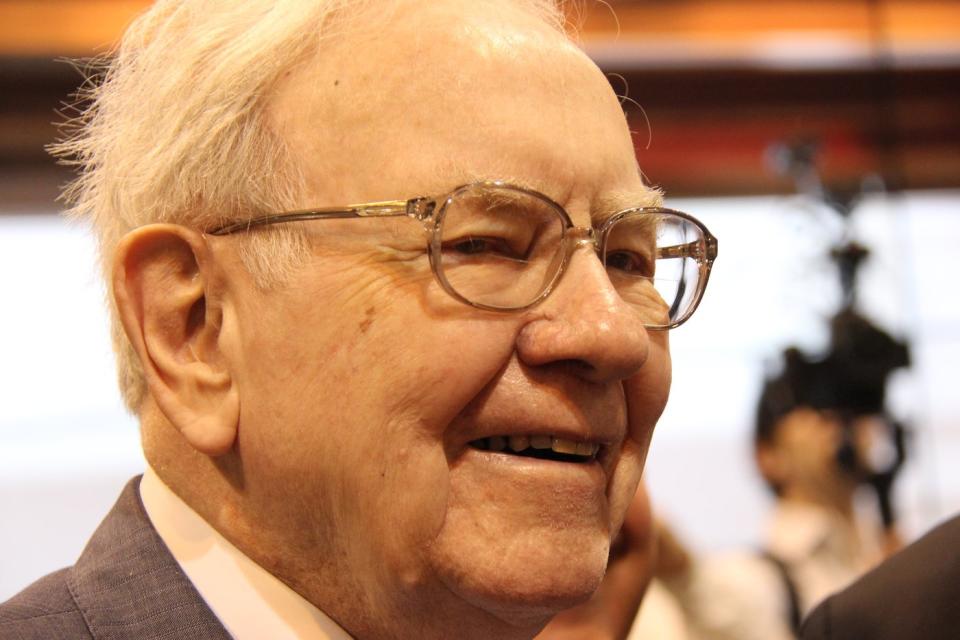In 1965, Warren Buffett became CEO of Berkshire Hathaway (NYSE: BRK.A)(NYSE: BRK.B) and began a stretch of notable outperformance, compared to Wall Street's benchmark stock indexes. Over nearly six decades, he's overseen a cumulative return in his company's Class A shares (BRK.A) that tops 5,700,000%!
Money managers who run circles around Wall Street tend to garner a lot of attention. But when you deliver a gain of more than 5,700,000%, investors will pay attention to your every word and potentially mirror your buying and selling activity.
What's interesting about the Oracle of Omaha's success is that he's predominantly been an open book regarding what traits he looks for in investments. For instance, Buffett regularly seeks out time-tested businesses with identifiable competitive advantages and strong management teams that can be held for years, if not decades. He's also a big fan of concentrating his company's invested assets in his best ideas.
However, not all 45 stocks held in Berkshire Hathaway's roughly $318 billion investment portfolio share the same outlook. While "years" tends to be the typical holding period for a stock in Berkshire's portfolio, Warren Buffett's latest annual letter to shareholders outlined eight stocks that were dubbed "indefinite" holdings.
As you might imagine, top investment ideas would be expected to stick around for a long time. These eight forever holdings currently account for a whopping 34% ($106.5 billion) of Berkshire Hathaway's invested assets.
No. 1: American Express, $39.2 billion (12.3% of invested assets)
Following the sale of around 150 million shares of Bank of America since the midpoint of July by Buffett and his team, credit services goliath American Express (NYSE: AXP) has vaulted to the No. 2 spot by market value in Berkshire's portfolio. "AmEx," as the company is more commonly known, has been a continuous holding by Buffett's company since 1991.
Financials are the Oracle of Omaha's favorite sector, largely because they're cyclical. Buffett and his top investment aides, Todd Combs and Ted Weschler, are fully aware that recessions are a normal and inevitable part of the economic cycle. Rather than throwing darts and trying to guess when these downturns will occur, they lean on a numbers game that undeniably works in their favor.
In the 79 years since World War II ended, there have been a dozen recessions in the U.S., and all but three resolved in less than 12 months. By comparison, almost every period of growth has endured multiple years, with two expansions hitting the 10-year mark. Wagering that the U.S. economy and consumer/enterprise spending will grow over long periods has been a genius move.
American Express also benefits from both sides of the transaction counter. In the U.S., it's the third-largest payment processor by credit card network purchase volume, which allows it to collect fees from merchants. However, it also generates fees and interest income from its line of credit cards.
Don't overlook AmEx's ability to attract high earners, either. High-income cardholders are less likely to adjust their spending habits or fail to pay their bill during minor economic disruptions.
No. 2: Coca-Cola, $29 billion (9.1% of invested assets)
The only forever holding that's been in Berkshire Hathaway's portfolio even longer than AmEx is beverage giant Coca-Cola (NYSE: KO), which has been continuously held since 1988.
Berkshire's cost basis in Coca-Cola is only $3.2475 per share, which equates to a nearly 60% yield on cost, based on Coke's annual payout of $1.94 per share. In other words, Buffett is seeing his initial investment in Coca-Cola more than double from the dividend income alone every two years.
One reason Coca-Cola is such a wonderful company is because it's a consumer staples stock. It's providing a good (beverages) that consumers need, regardless of how well or poorly their country's economy is performing. This leads to highly predictable operating cash flow year after year.
In terms of consumer goods companies, you'd probably struggle to find a business with better branding than Coca-Cola. Kantar's annual "Brand Footprint" report labeled Coca-Cola as the most-chosen brand by consumers off retail shelves for a 12th consecutive year. This is a testament to its lengthy history as a public company, as well as its ability to connect with mature and young audiences through a combination of brand ambassadors and digital media.
Furthermore, Coca-Cola's geographic diversity is virtually unmatched. On top of having more than two dozen brands that generate at least $1 billion in annual sales, the company has operations in every country except Cuba, North Korea, and Russia. Coca-Cola is able to generate meaningful cash flow in developed countries, all while moving the organic growth needle in emerging markets.
No. 3: Occidental Petroleum, $14.5 billion (4.6% of invested assets)
While it's been known for some time that AmEx and Coca-Cola are indefinite holdings for Warren Buffett, the addition of integrated oil and gas stock Occidental Petroleum (NYSE: OXY) in his February-released annual letter to shareholders was an eyebrow-raiser.
The Oracle of Omaha and his team began purchasing shares of Occidental in the first quarter of 2022. Since then, Berkshire's stake in the company has grown to almost 255.3 million shares, or about 27.3% of Occidental's outstanding shares. Buffett has been given permission by U.S. regulators to purchase up to a 50% stake in Occidental, but he has no interest in acquiring the company outright.
Since Warren Buffett is a big proponent of never betting against America, one of the most logical wagers he can make is on growing demand for energy commodities, such as oil.
One of the more interesting catalysts for Occidental is global crude oil supply constraints. Approximately three years of significant capital spending reductions by global energy majors during the COVID-19 pandemic has the industry playing catchup. When the supply of an in-demand good is tight, it tends to buoy its price.
Few integrated oil and gas operators generate a higher percentage of their revenue from drilling than Occidental. If the spot price of crude oil remains elevated or increases further, Occidental should enjoy an outsized benefit to its operating cash flow. Just be warned that a reciprocal event (i.e., a decline in the spot price of crude oil) would adversely impact its cash flow more than other integrated energy companies.
No. 4 through No. 8: The five Japanese trading houses, $23.7 billion (combined) from Mitsubishi (2.3% of invested assets), Itochu (2%), Mitsui (1.7%), Marubeni (0.8%), and Sumitomo (0.7%)
The other group of stocks Buffett talked up as forever holdings in his newest annual letter to shareholders is Japan's five major trading houses: Mitsubishi (OTC: MTSU.Y)(OTC: MSBHF), Itochu (OTC: ITOCY)(OTC: ITOCF), Mitsui (OTC: MITSY)(OTC: MITSF), Marubeni (OTC: MARUY)(OTC: MARUF), and Sumitomo (OTC: SSUM.Y)(OTC: SSUM.F).
You might be wondering why some of the companies Buffett is so high on account for less than 1% of Berkshire's invested assets. The simple reason is that Buffett and his team agreed to not purchase a greater than 9.9% stake in these five Japanese trading houses. These five stakes currently range from 7.5% (for Itochu) to 8.6% (for Mitsubishi) of outstanding shares.
One of the likely reasons the Oracle of Omaha favors these five businesses as indefinite holdings is because they're heavily ingrained in Japan's economy. Mitsubishi, Itochu, Mitsui, Marubeni, and Sumitomo are involved in oil and gas operations, food production, mining, renewable energy, chemicals, and so on. The list of what these companies have their fingers in would be a book in itself. If an investor believes the Japanese economy will grow over the long run, these trading houses make for no-brainer buys.
Valuation is another key lure for Japan's five trading houses. The stock market is historically pricey at the moment, and it's been this way for much of the last decade. Japan's trading houses have low price-to-earnings ratios and generally robust capital-return programs.
What's more, the management teams of these five businesses receive reasonably low compensation packages. This means the focus is on shareholder returns, which is something Warren Buffett appreciates immensely.
Should you invest $1,000 in American Express right now?
Before you buy stock in American Express, consider this:
The Motley Fool Stock Advisor analyst team just identified what they believe are the 10 best stocks for investors to buy now… and American Express wasn’t one of them. The 10 stocks that made the cut could produce monster returns in the coming years.
Consider when Nvidia made this list on April 15, 2005... if you invested $1,000 at the time of our recommendation, you’d have $650,810!*
Stock Advisor provides investors with an easy-to-follow blueprint for success, including guidance on building a portfolio, regular updates from analysts, and two new stock picks each month. The Stock Advisor service has more than quadrupled the return of S&P 500 since 2002*.
See the 10 stocks »
*Stock Advisor returns as of September 3, 2024
Bank of America and American Express are advertising partners of The Ascent, a Motley Fool company. Sean Williams has positions in Bank of America. The Motley Fool has positions in and recommends Bank of America and Berkshire Hathaway. The Motley Fool recommends Occidental Petroleum. The Motley Fool has a disclosure policy.
34% of Warren Buffett's $318 Billion Portfolio Is Invested in These 8 "Forever" Stocks was originally published by The Motley Fool

